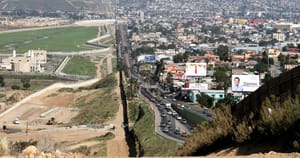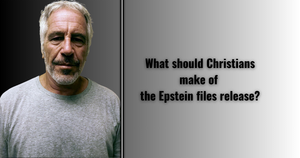Immigration has become one of the biggest topics of conversation in American politics, particularly as it pertains to illegal/undocumented crossings at the US-Mexico border. What truths from Scripture should shape a Christian's understanding of the border crisis?
The United States of America long has been described as a "melting pot." The country is filled with people from various other nations and cultures.
However, immigration law looks much different today than it did when Ellis Island processed over 12 million immigrants from 1892 to 1954. There are reasons for this, both political and practical. With stricter legislation surrounding legal immigration, many migrants have resorted to entering the United States without official legal authorization.
Some refer to these people as illegal, others call them unauthorized, and still others prefer the adjective undocumented. Much of the ways these individuals are described stem from the particular agenda of the name-giver, with those supporting shutting down the border opting for harsher language like "illegal," and those supporting more open policies preferring terms like "undocumented." All will be used in this writing with no intended agenda other than to seek biblical truth.
Below, we will discuss some objective truths about the border crisis before examining what the US's political right and political left have to say on the topic. Then, we will look to see what the Bible teaches that should influence a Christian's worldview as it pertains to this sensitive topic.
Some facts about the United States' border crisis
The statistics below are official numbers from the US Customs and Border Protection available at cbp.gov or from other linked agencies.
- Illegal/undocumented immigration (as measured by border encounters) decreased significantly in the late 2000s and through the 2010s. Since 2021, however, those numbers have exploded to all-time high marks.
- With numbers available for 2021, 2022, and 2023, those three years mark three of the four biggest in United States history. 2022 and 2023 were the only two years on record with more than 2 million of these border encounters.
- Most government agencies estimate that over 11 million immigrants are in the United States without visas or green cards, more than double the number estimated 30 years ago by Homeland Security. The total number shrank from 2007 to 2020 but is on a stark upward swing.
- The Trump administration has published a report on the border that states that there were over 1.7 million "gotaways" (migrants initially apprehended at the border who escaped or are released and enter the United States) during the Biden presidency. Considering there were about 6 million total encounters at the border from January of 2021 to December 2023 (2024 statistics are only partially available), a large percentage of border encounters end up with an individual reaching the United States despite being stopped initially.
- About 45% of the United States' encounters with undocumented migrants over the last five years have happened at the Texas-Mexico border (over 5 million in total), though Arizona, California, New Mexico, and Florida have all had at least 500,000 encounters.
- Per independent research at Pew Research Center, about 8.5 million unauthorized workers hold jobs of some kind in the United States. That represents about 5% of the American workforce. The estimated population of undocumented migrants is about 3.5% of the nation's total population.
Some observations about the United States' border crisis
- The right and the left do not agree about the severity of the migrant crisis. The left is incorrect in calling the crisis itself "manufactured," but the right is incorrect in believing that nothing at all has been manufactured. Nationalist feelings have, in some cases, given way to dehumanizing thoughts and behaviors stemming from racism or xenophobia.
- The United States has spent a ridiculous amount of money because of the border crisis. According to a combined study done by multiple government agencies, American taxpayers have footed a bill ranging between $150 billion and $400 billion as the government attempts to "fix" the current immigration issues. The constant back-and-forth of policy and infrastructure changes from democrats and republicans erasing and replacing what the other party has done only adds to the cost.
How the Left skews the narrative
- Many on the more liberal end of American politics argue that the majority of individuals seeking to come to the US are families seeking asylum from some form of trouble or persecution. The statistics indicate that to be false. According to the Customs and Border Protection department (using numbers from both the Biden and Trump administrations), the vast majority of people crossing the border without working through the proper channels (well over 60%) have been single, unaccompanied adults.
- Democratic politicians, especially prominent names like Senator Alexandria Ocasio-Cortez and former Vice President and Border Czar Kamala Harris have criticized the holding policies at the border, calling them cruel or extreme. There have been some instances in which that is undeniably correct. However, the extent to which that is true doesn't match up with liberal narrative.
- Many on the left argue that any opposition to immigration of any kind is racist, xenophobic, or both. While those issues do exist, categorizing any border opinion that differs from liberal sentiment as racist or xenophobic is absurd.
How the Right skews the narrative
- Republicans argue that adding illegal immigrants adds potential criminals to the United States. Objectively, without consideration of percentages, that is true. Just on the first day of President Trump's second term, US Immigration and Customs Enforcement arrested over 300 undocumented individuals with criminal records. Among that group were at least two violent criminals, one attempted murderer and another convicted of crimes against a child.
- One of the major conservative talking points surrounding crime and immigration goes against the right-leaning narrative, however. The violent crime rate for illegal migrants is lower than that of American citizens in some places, while it is higher in others. In total, the statistics reported by government agencies indicate a lower overall violent crime rate for undocumented migrants than individuals born on American soil. While no violent crime should be ignored or looked past, recorded statistics do not support a widespread, consistently higher crime rate among migrants than among naturalized citizens. It is worth noting, though, that there are some non-violent crimes (especially ones regarding certain taxes and similar issues) that cannot be tracked effectively for undocumented individuals. Several recent studies on these statistics have been removed from public government websites.
- Many on the right have sensationalized the instances of violent crimes committed by migrants (to be clear, these are still tragic events) and painted a picture that a large number of undocumented migrants have or will commit similar crimes. That shouldn't be as it doesn't match reality.
What the Bible says
As usual, the truth about what is happening in our country and how Christians should respond lies somewhere between the two political extremes. Here's a look at what the Bible says that is related to this topic.
First, undocumented immigrants are people and should be treated as such.
Regardless of a person's legal status as an immigrant, every person on Earth was made in the image of God.
In the creation narrative, Genesis 1:26 states, "Then God said, 'Let us make man in our image, after our likeness. And let them have dominion over the fish of the sea and over the birds of the heavens and over the livestock and over all the earth and over every creeping thing that creeps on the earth.'"
Human beings were made, from the very beginning, in God's image. This Imago Dei shows the Lord's unique care and affection for mankind above all other creation. While Christ's love as displayed by his saving work on the cross is for believers, His love as it pertains to the created order is for all people as the one aspect of creation with dominion over the rest.
Truly racist or xenophobic behavior goes against God's design of human interaction and relationship because it goes against his own love for people.
Christians must love their neighbors.
Contrary to popular belief, God does not command His people to love everyone in the same exact way. Christians are called to love the Lord, then their families, and then their neighbors (in that order) in a special way.
In some biblical contexts, "neighbors" refers to fellow believers. In others, though, it quite literally means anyone within one's general context. The Greek word used for neighbor in Jesus' Parable of the Good Samaritan in Luke 10 can be translated to "one who is near."
The connection of this conversation to loving a neighbor is simple. The Messiah commands his people in Mark 12:29-31 to love their Lord and love their neighbor. "Jesus answered, “The most important (commandment) is, ‘Hear, O Israel: The Lord our God, the Lord is one. And you shall love the Lord your God with all your heart and with all your soul and with all your mind and with all your strength.’ The second is this: ‘You shall love your neighbor as yourself.’ There is no other commandment greater than these.”
In this pursuit, it would be a poor demonstration of Christ-like love to largely ignore these neighbors. However, it would be poor stewardship practice (at minimum) or a sinful dereliction of duty (more likely) for a believer to endanger their families or fellow believers along the way.
Scripture speaks to how God's people should treat foreign neighbors.
Specifically, the Bible speaks to our responsibility to treat foreigners fairly and to treat them well.
Leviticus 19:33-34 instructs God's people how to interact with "strangers" in the land, stating, "When a stranger sojourns with you in your land, you shall not do him wrong. You shall treat the stranger who sojourns with you as the native among you, and you shall love him as yourself, for you were strangers in the land of Egypt: I am the Lord your God."
The "you shall not do him wrong" portion of this command is a clear charge of fair and just treatment without prejudice. With that, natural consequences must exist for those who break the law by avoiding proper immigration. More on that later.
However, fair and just treatment coupled with the command "you shall love him as yourself" (and a reminder to Israel of their former status as strangers in Egypt who weren't always treated justly or with love), also implies good treatment of these people.
Loving a neighbor, whether foreign or domestic, will look different in different contexts, but it should be easily identifiable. Jesus says in John 13:34-35: "'A new commandment I give to you, that you love one another: just as I have loved you, you also are to love one another. By this all people will know that you are my disciples, if you have love for one another.'”
Migrants, like all people, should be held to the standard of God's Law and the law of the land.
God's Word is clear: if a person resides in a particular area, they should be held to the law of the land (excluding, of course, instances in which the law of the land is contrary to God's Law).
Romans 13:1-2 say, "Let every person be subject to the governing authorities. For there is no authority except from God, and those that exist have been instituted by God. Therefore, whoever resists the authorities resists what God has appointed, and those who resist will incur judgment."
If someone is breaking the law (like coming to a country without doing so legally), there should be some form of penalty.
Exodus 12:49 also says, "There shall be one law for the native and for the stranger who sojourns among you." While this passage specifically refers to the institution of the Passover among God's people and those who dwell among God's people, the sentiment is repeated elsewhere.
When the Lord gives Moses additional explanation on the Law throughout Exodus and Leviticus, He explicitly states (in Exodus 21 immediately following the 10 Commandments) that the law should apply to outsiders and/or slaves who are not part of God's people but who are among God's people. Why? Because they live there, too, and the Law of the Lord is perfect. Remember in Romans 1:20, the Holy Spirit inspired Paul to write that the lost "are without excuse" for not following the Law.
Simply put, if Christians believe in upholding the Law of God, then we must also believe in all people–believer or unbeliever, countryman or foreigner–being held to that standard, too.
Helping those in need is a requirement.
While not at the expense of one's other responsibilities before God, family, or other believers, Christians are required to help those in need.
Proverbs 14:21 demonstrates this truth. "Whoever despises his neighbor is a sinner, but blessed is he who is generous to the poor."
While Christians should not be in the business of encouraging others to break the law, they can help provide for physical needs, especially for the most vulnerable. While undocumented immigrants should face some form of consequence for breaking the law (more on that later), that doesn't eliminate the requirement for Christians to treat them with human decency and empathy.
Christians must have a heart for the lost.
The Great Commission in Matthew 28:19 ("Go, therefore and make disciples of all nations, baptizing them in the name of the Father and of the Son and of the Holy Spirit, teaching them to observe all that I have commanded you. And behold, I am with you always, to the end of the age.") compels the Church to go to the ends of the world to reach people with the gospel.
Sometimes, though, the ends of the world come to us.
While gathering explicit statistics for this is impossible, a large number of people crossing the border are lost. By default then, a large number of people crossing the border are people to whom Christians are called to witness.
One of the primary, God-given responsibilities of Christians is to make Christ known to those who do not already know Him. Despite there being tremendous nuance and additional complications surrounding the issue of illegal immigration, Christians should take advantage of any opportunities to have gospel-centered conversations and Christ-like influence.
It is not wrong for nations to secure their borders or for people to protect themselves and their property.
In the Lord's sovereignty, He establishes borders, kingdoms, and governments. Acts 17:26 reads, "And [the Lord] made from one man every nation of mankind to live on all the face of the earth, having determined allotted periods and the boundaries of their dwelling place."
Countries desiring national political autonomy and security are common in Scripture. As evidenced throughout the Old Testament and even further through the life and ministry of Paul, the citizenship of a country's people is important. While the Lord repeatedly commands his people to treat foreigners well and to even welcome ones into their land who are fleeing real persecution, He also rebukes his people for carelessly (or, at times, with sinful intentions) opening their borders, regarding both their political and spiritual well-being. For legal immigrants, full citizenship and rights received by citizens took time.
While "every good gift and every perfect gift is from above" (James 1:17), God grants within mankind's dominion of the world a right to ownership of property as stewards of His creation. The eighth commandment (Exodus 20:15- "You shall not steal.") gives credence to that thought.
The sixth commandment (Exodus 20:13- "You shall not murder.") also provides a glimpse into the value of human life and, thus, the importance of protecting it.
Just as one locks the doors to his house to protect the people and property within it, a nation does the same. That does mean that no one ever visits or that there is no possibility of another person coming to live in that house. It does, though, mean that visitors should abide by the rules of the house and that anyone added to the household must do so in a manner that is above board and approved by the owner.
Final verdict
The immigration crisis in America is a real one. Considering resources and security, the way things have been in recent years is not good or sustainable. Both sides of the typical political aisle have missed the mark in some way in their handling of the border.
The United States should (and usually does) welcome immigrants. However, entering the US without proper authorization constitutes an individual as a lawbreaker who should receive due consequences.
The Bible is clear, though, that no matter the status of another person, that every Christian is required to love their neighbor. Any prejudicial behavior, word, or thought is sin.
For those who are in Christ, there must be an intentional effort to find balance between seeking justice and demonstrating God-honoring love and empathy.




